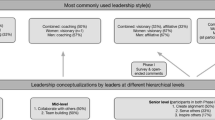Abstract
Objective
Creating training opportunities for the development of effective leaders is an increasingly important goal in psychiatry residency training programs. This article examines the long-term perceived impact of the Tarrytown Chief Residents Leadership Conference on preparing psychiatric residents for future leadership positions.
Methods
Self-report surveys from attendees who participated in the conference between 1998 and 2011 were examined.
Results
Five hundred and forty-one completed surveys were returned (43 % response rate). Eighty-six percent of respondents reported moderate to extreme improvement in leadership confidence post-conference. Most respondents indicated at least moderate improvement in self-awareness (93 %), understanding of group process (92 %), and willingness to address conflict (89 %). Ninety percent felt the conference was important to their residency training, and 80 % indicated increased interest in leadership post-conference.
Conclusions
Responders reported lasting improvements in their confidence in and perceived ability to utilize skills necessary for effective leadership, demonstrating the value of this experiential learning opportunity.
Similar content being viewed by others
References
Accreditation Council for Graduate Medical Education: Program Requirements for Graduate Medical Education in Psychiatry. July 2007. Available at http://www.acgme.org/acgmeweb/Portals/0/PFAssets/ProgramRequirements/405pr07012007.pdf. Accessed 3 Oct 2012.
Williams SJ. Training needs for physician leaders. J Health Adm Educ. 2001;19:195–202.
Sockalingam S, Stergiopoulos V, Maggi J. Physicians as managers: psychiatry residents' perceived gaps in knowledge and skills in administrative psychiatry. Acad Psychiatry. 2007;31:304–7.
Avolio BJ, Hannah ST. Developmental readiness: accelerating leader development. Consult Psychol J: Pract Res. 2008;4:331–47.
Lord RG, Hall RJ. Identity, deep structure and the development of leadership skill. Leadersh Q. 2005;16:591–615.
Lieff S, Albert M. What do we do? Practices and learning strategies of medical education leaders. Med Teach. 2012;34:312–9.
DeRue DS, Wellman N. Developing leaders via experience: the role of developmental challenge, learning orientation, and feedback availability. J Appl Psychol. 2009;94:859–75.
Kolb AY, Kolb DA. Learning styles and learning spaces: enhancing experiential learning in higher education. Acad Manag Learn Educ. 2005;4:193–212.
Steinert Y, Naismith L, Mann K. Faculty development initiatives designed to promote leadership in medical education. A BEME systematic review: BEME guide no. 19. Med Teach. 2012;34(6):483–50.
Doughty RA, Williams PD, Brigham TP, Seashore C. Experiential leadership training for pediatric chief residents: impact on individuals and organizations. J Grad Med Educ. 2010;2:300–5.
Author information
Authors and Affiliations
Corresponding author
Rights and permissions
About this article
Cite this article
Schwartz, B.J., Blackmore, M.A. & Weiss, A. The Tarrytown Chief Residents Leadership Conference: A Long-Term Follow-up. Acad Psychiatry 38, 15–18 (2014). https://doi.org/10.1007/s40596-013-0016-4
Received:
Accepted:
Published:
Issue Date:
DOI: https://doi.org/10.1007/s40596-013-0016-4




